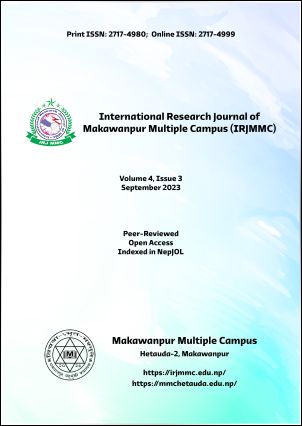Socio-cultural Aspect of Household Waste Management and Its Effects on Public Health
DOI:
https://doi.org/10.3126/irjmmc.v4i3.58966Keywords:
Feast and festival, Household solid waste, Public health, Socio-cultural aspect, Solid waste managementAbstract
The main goal of this study is to analyze the knowledge and practices of solid waste management and its effects on public health. Hypotheses of the study were- There was no significant association between Religious and cultural practices and the causes of waste production, between knowledge of solid waste and methods of solid waste management, between place of residence and methods of cleanliness, between place of residence and solid waste management, between solid waste management and its effect on public health. Analytical research design was applied and the lottery method was administered to select the area and required number of respondents. Equal number of respondents (50 of each) from 3 selected local governments (Hetauda sub-metropolitan, Thaha Municipality and Gadhi rural Municipality), out of 10 local governments, were taken and administered interview schedule to collect the data. The data has been collected in 2023. People had knowledge of solid waste categories but they managed the waste in unscientific way. Seventy-two percent of respondents threw the solid waste everywhere. So, the knowledge did not play the vital role to manage solid wastes. There was no significant association between knowledge of solid waste categories and the method of solid waste management (p>0.916). The consumerism culture and the celebration of various festivals had higher contribution to produce solid wastes. Incineration was the most favorable method of solid waste management in both rural and urban areas which had resulted the spread of various diseases. The people themselves should be aware and responsible to protect their own health by their own effort.
Downloads
Downloads
Published
How to Cite
Issue
Section
License
Copyright (c) 2023 Ramji Prasad Adhikari, Bhashkar Chandra Adhikari, Rojina Karki, Dev Kumar Ghising, Dipesh Basnet, Shrisha Sapkota, Kiran Lama, Sabita Dahal

This work is licensed under a Creative Commons Attribution-NonCommercial 4.0 International License.

